Ercole Massaglia (1890-1941) was an Italian professional (studio) photographer. He signed his photos with “Massaglia, Torino”. Among them were many portraits of actors and actresses of the Italian stage and cinema as well as the Italian aristocracy and upperclass.
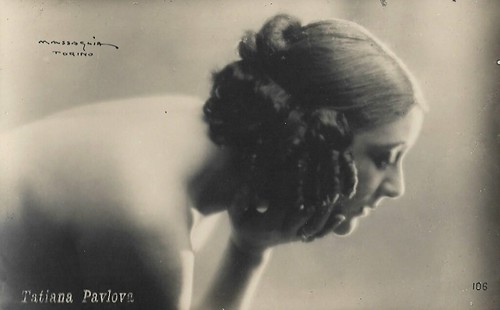
Tatiana Pavlova. Italian postcard, no. 106. Photo: Massaglia, Torino.

Tatiana Pavlova. Italian postcard, no. 107. Photo: Massaglia, Torino. Collection: Didier Hanson.
Russian actress Tatiana (or Tatyana) Pavlova (1893-1975) left Moscow after the revolution and found film work in the silent Italian cinema. Later she became an innovating stage director.
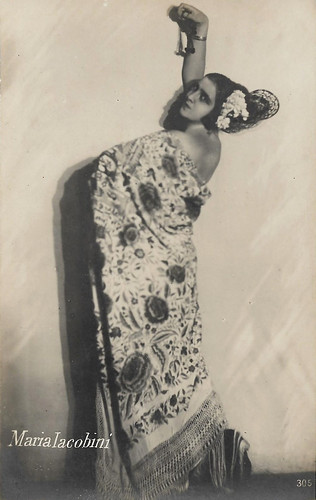
Maria Jacobini. Italian postcard by Ed. Ballerini & Fratini Co., Firenze, no. 305. Photo: Massaglia, Torino.
Italian diva Maria Jacobini (1892-1944) in her outfit for the film Amore rosso (Gennaro Righelli, 1921), set in Spain.

Lydia Quaranta. Italian postcard, no. 316. Photo: Massaglia, Torino.
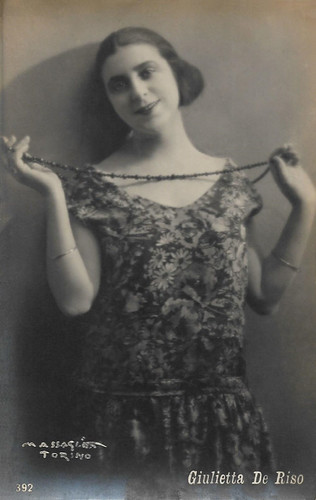
Giulietta De Riso. Italian postcard by Ballerini & Fratini, Florence, no. 392. Photo: Massaglia.
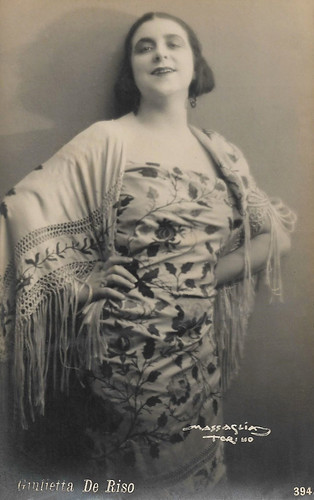
Giulietta De Riso. Italian postcard by Ed. Ballerini & Fratini Co., Firenze, no. 394. Photo: Massaglia, Torino.
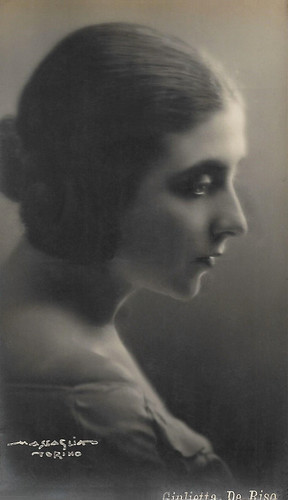
Giulietta De Riso. Italian postcard by Ed. Ballerini & Fratini, Florence. Photo: Massaglia, Turin.
Giulietta De Riso (1898-1988) was an Italian stage and - mainly silent - film actress.
Ercole Massaglia was born in Asti on 2 July 1890. His family emigrated to Corfu in 1902, but he returned to Turin in 1915, during the First World War, possibly because of Italy joining the Allies.
He opened a photo studio in Via Cernaia 34 in Turin. The Turinese photographic magazine Luci e Ombre, founded in 1922 by the Gruppo piemontese di fotografia artistica, published some of his photos in the years 1923 to 1929 and in 1931.
Massaglia took part in the first International Exhibition of Photography, Optics and Cinematography of 1923 in Turin with some images of actress Paola Borboni and was awarded with an honorary diploma of merit and a gold medal.
In his studio the most famous figures of culture, politics and industry of the time were immortalised, such as Crown Prince Umberto and Princess Jolanda of Savoy, resulting in the text "Supplier of the Royal House of Savoy" on the backs of his pictures.
But also the stage actors such Paola Borboni, Dina Galli, Lydia Quaranta, Vera Vergani, Giulietta De Riso, Gianfranco Giachetti and Annibale Betrone, the painter Giacomo Grosso and the sculptor Vincenzo Gemito were portrayed by Massaglia.
In 1924 he won a 100 lire award for 5 years, for the Professional School of Photography and Optics "Teofilo Rossi". In that same year he was nominated Knight of the Crown of Italy and vice president of the Union of Professional Photographers of Turin. He also won a gold medal "Gevaert" and a "Callegari".
In 1927 two of his images, including the portrait of Cesare Schiaparelli, were published in the Second Yearbook of the Subalpine Photographic Society. In the Corriere Fotografico of December 1928 an article reappeared from Il Nazionale, in which a profile of Ercole Massaglia was traced.
This article accurately described his artistic skills as a portraitist, in particular, and the modernity and efficiency of his studio. In those years, it was considered one of the most avant-garde-like studios in Italy, the only one to own certain machines like the Super-Ego of ing. Bianchi from Milan. In 1931 Massaglia took part in the First Experimental Exhibition of Futurist Photography, held in Turin.
Cavaliere Ercole Massaglia died in Turin on 29 September 1941.

Maria Melato. Italian postcard, no. 408. Photo: Massaglia, Torino.

Vera Vergani. Italian postcard, no. 601/2. Photo: Massaglia, Torino.
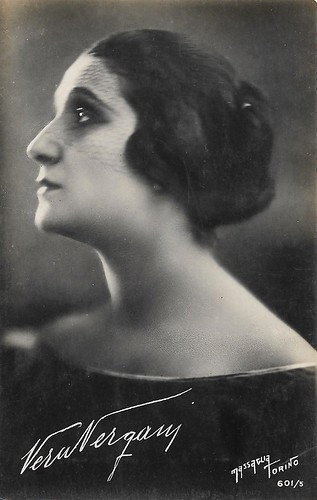
Vera Vergani. Italian postcard by Ed. Ballerini & Fratini, Firenze, no. 601/5. Photo: Massaglia, Torino.

Vera Vergani. Italian postcard by Casa Editrice G. Ballerini & Fratini, Firenze, no. 601/6. Photo: Massaglia, Torino.
Charming and elegant Vera Vergani (1894-1989) was primarily an Italian stage actress, famous for her interpretations in the first stagings of Pirandello’s plays. She became one of the popular divas of the Italian cinema when she appeared in a dozen silent films between 1917 and 1921 for directors like Augusto Genina and Roberto Roberti.

Paola Borboni. Italian postcard by G. Ballerini & Co., Firenze, no. 602/1. Photo: Massaglia, Torino.

Paola Borboni. Italian postcard by G. Ballerini & Co., Firenze, no. 602/3. Photo: Massaglia, Torino.
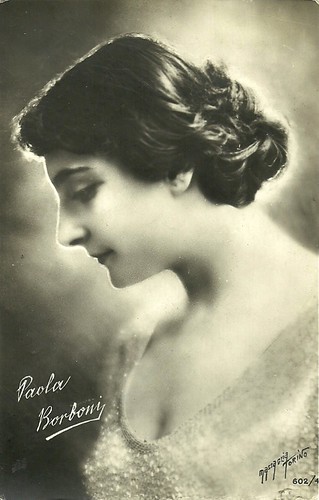
Paola Borboni. Italian postcard by G. Ballerini & Co., Firenze, no. 602/4. Photo: Massaglia, Torino.
Paola Borboni (1900-1995) was one of the greatest stage actresses of Italy. She also played in many films. She was often heard on the radio and seen in television, but her true passion was the stage.

Dina Galli. Italian postcard by G. Ballerini & Co., Firenze, no. 603/4. Photo: Massaglia, Torino.

Dina Galli. Italian postcard by G. Ballerini & Co., Firenze, no. 603/5. Photo: Massaglia, Torino.

Dina Galli. Italian postcard by G. Ballerini & Co., Firenze, no. 603/6. Photo: Massaglia, Torino.
Dina Galli (1877-1951) was a classic Italian comedienne who also performed in Italian silent and sound cinema.
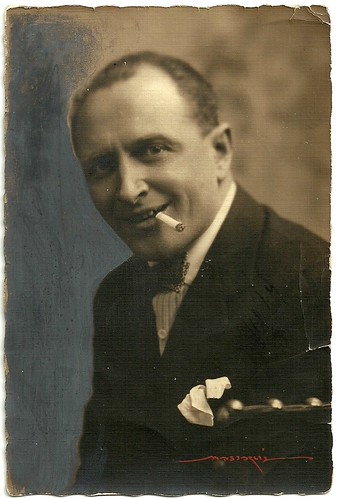
Annibale Betrone. Italian postcard. Photo: Massaglia, Torino.
Source: Comune di Torino (Italian).
This post was last updated on 12 February 2021.

Tatiana Pavlova. Italian postcard, no. 106. Photo: Massaglia, Torino.

Tatiana Pavlova. Italian postcard, no. 107. Photo: Massaglia, Torino. Collection: Didier Hanson.
Russian actress Tatiana (or Tatyana) Pavlova (1893-1975) left Moscow after the revolution and found film work in the silent Italian cinema. Later she became an innovating stage director.

Maria Jacobini. Italian postcard by Ed. Ballerini & Fratini Co., Firenze, no. 305. Photo: Massaglia, Torino.
Italian diva Maria Jacobini (1892-1944) in her outfit for the film Amore rosso (Gennaro Righelli, 1921), set in Spain.

Lydia Quaranta. Italian postcard, no. 316. Photo: Massaglia, Torino.

Giulietta De Riso. Italian postcard by Ballerini & Fratini, Florence, no. 392. Photo: Massaglia.

Giulietta De Riso. Italian postcard by Ed. Ballerini & Fratini Co., Firenze, no. 394. Photo: Massaglia, Torino.

Giulietta De Riso. Italian postcard by Ed. Ballerini & Fratini, Florence. Photo: Massaglia, Turin.
Giulietta De Riso (1898-1988) was an Italian stage and - mainly silent - film actress.
Supplier of the Royal House of Savoy
Ercole Massaglia was born in Asti on 2 July 1890. His family emigrated to Corfu in 1902, but he returned to Turin in 1915, during the First World War, possibly because of Italy joining the Allies.
He opened a photo studio in Via Cernaia 34 in Turin. The Turinese photographic magazine Luci e Ombre, founded in 1922 by the Gruppo piemontese di fotografia artistica, published some of his photos in the years 1923 to 1929 and in 1931.
Massaglia took part in the first International Exhibition of Photography, Optics and Cinematography of 1923 in Turin with some images of actress Paola Borboni and was awarded with an honorary diploma of merit and a gold medal.
In his studio the most famous figures of culture, politics and industry of the time were immortalised, such as Crown Prince Umberto and Princess Jolanda of Savoy, resulting in the text "Supplier of the Royal House of Savoy" on the backs of his pictures.
But also the stage actors such Paola Borboni, Dina Galli, Lydia Quaranta, Vera Vergani, Giulietta De Riso, Gianfranco Giachetti and Annibale Betrone, the painter Giacomo Grosso and the sculptor Vincenzo Gemito were portrayed by Massaglia.
In 1924 he won a 100 lire award for 5 years, for the Professional School of Photography and Optics "Teofilo Rossi". In that same year he was nominated Knight of the Crown of Italy and vice president of the Union of Professional Photographers of Turin. He also won a gold medal "Gevaert" and a "Callegari".
In 1927 two of his images, including the portrait of Cesare Schiaparelli, were published in the Second Yearbook of the Subalpine Photographic Society. In the Corriere Fotografico of December 1928 an article reappeared from Il Nazionale, in which a profile of Ercole Massaglia was traced.
This article accurately described his artistic skills as a portraitist, in particular, and the modernity and efficiency of his studio. In those years, it was considered one of the most avant-garde-like studios in Italy, the only one to own certain machines like the Super-Ego of ing. Bianchi from Milan. In 1931 Massaglia took part in the First Experimental Exhibition of Futurist Photography, held in Turin.
Cavaliere Ercole Massaglia died in Turin on 29 September 1941.

Maria Melato. Italian postcard, no. 408. Photo: Massaglia, Torino.

Vera Vergani. Italian postcard, no. 601/2. Photo: Massaglia, Torino.

Vera Vergani. Italian postcard by Ed. Ballerini & Fratini, Firenze, no. 601/5. Photo: Massaglia, Torino.

Vera Vergani. Italian postcard by Casa Editrice G. Ballerini & Fratini, Firenze, no. 601/6. Photo: Massaglia, Torino.
Charming and elegant Vera Vergani (1894-1989) was primarily an Italian stage actress, famous for her interpretations in the first stagings of Pirandello’s plays. She became one of the popular divas of the Italian cinema when she appeared in a dozen silent films between 1917 and 1921 for directors like Augusto Genina and Roberto Roberti.

Paola Borboni. Italian postcard by G. Ballerini & Co., Firenze, no. 602/1. Photo: Massaglia, Torino.

Paola Borboni. Italian postcard by G. Ballerini & Co., Firenze, no. 602/3. Photo: Massaglia, Torino.

Paola Borboni. Italian postcard by G. Ballerini & Co., Firenze, no. 602/4. Photo: Massaglia, Torino.
Paola Borboni (1900-1995) was one of the greatest stage actresses of Italy. She also played in many films. She was often heard on the radio and seen in television, but her true passion was the stage.

Dina Galli. Italian postcard by G. Ballerini & Co., Firenze, no. 603/4. Photo: Massaglia, Torino.

Dina Galli. Italian postcard by G. Ballerini & Co., Firenze, no. 603/5. Photo: Massaglia, Torino.

Dina Galli. Italian postcard by G. Ballerini & Co., Firenze, no. 603/6. Photo: Massaglia, Torino.
Dina Galli (1877-1951) was a classic Italian comedienne who also performed in Italian silent and sound cinema.

Annibale Betrone. Italian postcard. Photo: Massaglia, Torino.
Source: Comune di Torino (Italian).
This post was last updated on 12 February 2021.
No comments:
Post a Comment